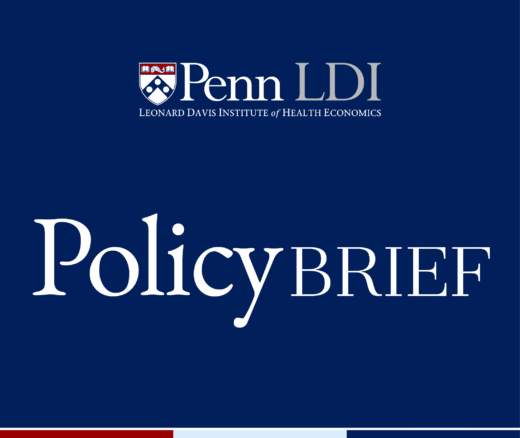
Analysis of the Rural Health Transformation Program
Memo: Response to Request for Analysis
News | Video
As a panelist at the White House Minority Health Forum in April 2024, LDI Senior Fellow Carmen Guerra, MD, MSCE, warned of the equity implications of genetic-based immunological drugs that are dependent on a genetic element that is prominent in white populations but not in other populations.
Guerra is Vice Chair of Diversity and Inclusion in the Perelman School of Medicine’s Department of Medicine and Associate Director of Diversity and Inclusion at the University of Pennsylvania’s Abramson Cancer Center. As a nationally recognized expert in the field of health and health care disparities, she was invited to be a panelist on the White House Office of Science and Technology Policy’s inaugural White House Minority Health Forum.
The event was organized to recognize National Minority Health Month and to highlight progress, discuss challenges, and identify actions that the federal government and private sector can take to improve health outcomes and reduce health inequities for racial and ethnic minority communities across the country.
Setting the tone of the forum sessions, Director of the Office of Science and Technology Policy Arati Prabhakar said, “Our health outcomes in America are simply unacceptable for the richest country in the world and that is especially true in our ethnic minority communities and our racial minority communities.”
Guerra was a panelist in the “Research Innovation for Health Equity” session moderated by Cameron Webb, MD, JD, Director of Health Policy and Equity at the University of Virginia School of Medicine and former senior advisor to the White House Covid-19 Response Team.
He asked Guerra, “What are we missing in our current paradigm in terms of how to effectively study how to create opportunities for everybody to achieve their best health?”
“One area is genomic data and how it lacks representation for all groups,” said Guerra. “Another example is the immunotherapy field that is exploding with new groups of therapies for many diseases, including cancer. Some really interesting recent research shows that many of the targeted immunological therapies being developed rely on a specific HLA allele that is actually very prominent in most white populations in the Americas and Europe but doesn’t represent the rest of the population of the world.”
She said that racial health disparity “is going to get worse because about 80% of the therapies now being studied are specific for that allele in Anglo populations.”
An HLA allele is a variant form of a gene within the human leukocyte antigen (HLA) system involved in regulating the immune system. A recent commentary in the Journal for ImmunoTherapy of Cancer titled “Ensuring Equity in the Era of HLA-Restricted Cancer Therapeutics,” noted that a new melanoma-targeting drug approved in 2022 by the U.S. Food and Drug Administration is dependent on an HLA allele whose “expression varies considerably among ethnic groups. It is most frequently expressed in Europeans, and less commonly in African Americans and people of Asian or Pacific Island ancestry. … We advocate for proactive consideration of the populations eligible for each HLA-restricted therapeutic in development to ensure this emerging therapeutic class does not compound long-standing health disparities.”


Memo: Response to Request for Analysis

Lessons from the Past, Imperatives for the Future

A New Study of a Sample of Facilities Found Half Without Any Behavioral Health Staff

Physicians Were Paid About 10% Less for Visits Involving Black and Hispanic Patients, With Pediatric Gaps Reaching 15%, According to a First-of-Its-Kind LDI Analysis

A New Review Finds Hospital Mergers Raise Prices Without Improving Care, and Urges Regulators to Stop Accepting Quality Claims to Justify Consolidations

Technology Helps Older Adults Stay at Home—But May Delay Necessary Transitions to Higher Levels of Care